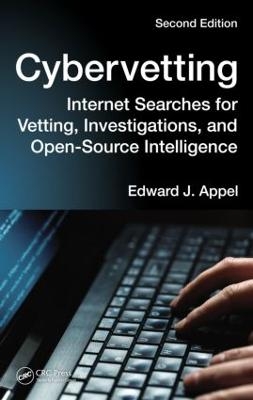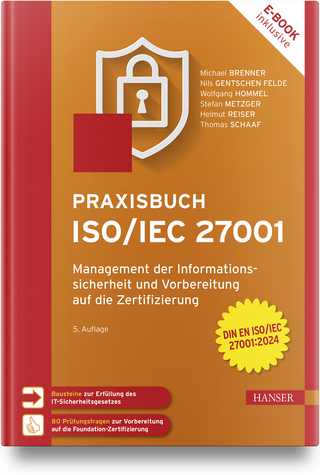
Cybervetting
Crc Press Inc (Verlag)
978-1-4822-3885-3 (ISBN)
Relevant to investigators, researchers, legal and policy professionals, educators, law enforcement, intelligence, and other practitioners, this book establishes the core skills, applicable techniques, and suitable guidelines to greatly enhance their practices. The book includes the outcomes of recent legal cases relating to discoverable information on social media that have established guidelines for using the Internet in vetting, investigations, and open-source intelligence. It outlines new tools and tactics, and indicates what is and isn’t admissible under current laws. It also highlights current cybervetting methods, provides legal frameworks for Internet searching as part of investigations, and describes how to effectively integrate cybervetting into an existing screening procedure.
What’s New in the Second Edition:
Presents and analyzes results of two recent studies of the effectiveness of cybervetting
Updates key litigation trends, investigative advances, HR practices, policy considerations, social networking, and Web 2.0 searching
Includes the latest tactics and guidelines for cybervetting
Covers policy, legal issues, professional methodology, and the operational techniques of cybervetting
Provides a strengthened rationale, legal foundation, and procedures for successful cybervetting
Contains compelling evidence that trends in legal, policy, and procedural developments argue for early adoption of cybervetting
Presents new strategies and methodologies
Cybervetting: Internet Searches for Vetting, Investigations, and Open-Source Intelligence, Second Edition
is a relevant and timely resource well suited to businesses, government, non-profits, and academia looking to formulate effective Internet search strategies, methodologies, policies, and procedures for their practices or organizations.
Edward J. (Ed) Appel, Sr., is owner-principal of iNameCheck, a boutique private investigative, consulting, and training firm. He is a retired FBI special agent and executive, specializing in counterintelligence and terrorism, and served as the director of counterintelligence and security programs at the National Security Council and the White House. Appel has written numerous government-sponsored classified and unclassified counterintelligence and counterterrorism studies, lectures, and papers. Ed is a graduate of Georgetown University, the Defense Language Institute, and the National Cryptologic School, and taught at the FBI Academy and as visiting lecturer at such institutions as Carnegie-Mellon, MIT Lincoln Labs, Georgetown University, and Johns Hopkins University.
Behavior and Technology. The Internet’s Potential for Investigators and Intelligence Officers. Behavior Online. Use and Abuse: Crime and Misbehavior Online. Internet Search Studies. Implications for the Enterprise. Legal and Policy Context. Liability, Privacy, and Management Issues. Laws. Litigation. International and Domestic Principles. Professional Standards and the Internet. The Insider Threat. Framework for Internet Searching. Internet Vetting and Open-Source. Intelligence Policy. Tools, Techniques, and Training. Proper Procedures for Internet Searching. Introduction. Internet Search Methodology. Preparation and Planning. Search Techniques. Finding Sources. Automation of Searching. Internet Intelligence Reporting. Illicit Websites and Illegal Behavior Online. Model Cybervetting Investigative Guidelines. A Model Internet Investigation Policy. A Model Internet Posting Policy. Internet Intelligence Issues. Index.
| Zusatzinfo | 2 Tables, black and white; 22 Illustrations, black and white |
|---|---|
| Verlagsort | Bosa Roca |
| Sprache | englisch |
| Maße | 156 x 234 mm |
| Gewicht | 612 g |
| Themenwelt | Informatik ► Netzwerke ► Sicherheit / Firewall |
| Mathematik / Informatik ► Informatik ► Web / Internet | |
| Wirtschaft ► Betriebswirtschaft / Management ► Personalwesen | |
| ISBN-10 | 1-4822-3885-3 / 1482238853 |
| ISBN-13 | 978-1-4822-3885-3 / 9781482238853 |
| Zustand | Neuware |
| Haben Sie eine Frage zum Produkt? |
aus dem Bereich


